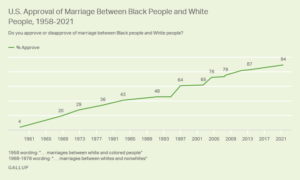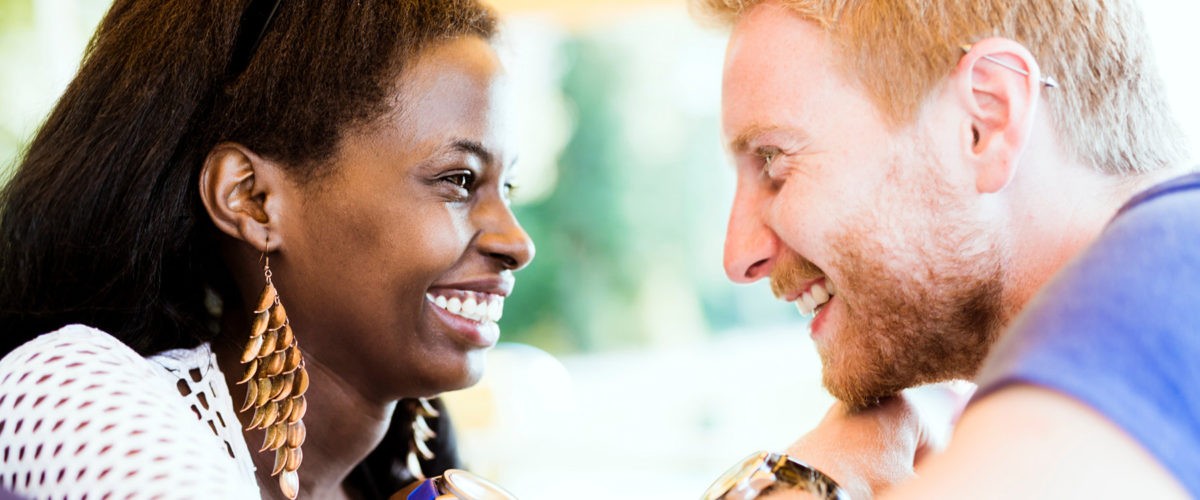Amid an American culture that appears as divided over race as during the Civil Rights Movement comes surprising news from Gallup: Nearly all Americans now approve of marriages between Black people and white people.
What many take for granted today was extremely controversial when Gallup first asked the question in 1958. At that time, only 4% of Americans approved of interracial marriage.
Today, 94% of Americans approve, according to July polling by Gallup.
“Americans are now nearly unanimous in their approval of marriages between Black people and white people,” the Gallup report explains. “The shifts over time document changes in U.S. social mores as well as differing attitudes between current and past generations of Americans.”
“Americans are now nearly unanimous in their approval of marriages between Black people and white people.”
This mirrors sweeping changes in American attitudes about accepting same-sex marriage, although that change happened in a shorter period of time.
Natalie Jackson, director of research at Public Religion Research Institute, previously explained that support for same-sex marriage in America “has undergone a complete reversal in the last 15 years” — one of the fastest shifts in public opinion ever documented.
PRRI last year reported that support for same-sex marriage has grown from one-third in 2007 to two-thirds today, and opposition has dropped from 55% to 27%. That parallels Gallup’s own data, which earlier this year found that 70% of Americans now support same-sex marriage, a new high in its polling since 1996. Current support marks a 10-point increase since 2015, when the U.S. Supreme Court ruled that all states must recognize same-sex marriages.
Both interracial marriage and same-sex marriage offer studies in social acceptance of one aspect of cultural experience amid backlash against minorities’ gains in other areas of American life.
While Americans almost universally approve of interracial marriage today, “Americans have become less likely to say that civil rights for Black Americans have improved, and they have recently become more likely to say that new civil rights laws are needed to reduce discrimination against Black people,” Gallup noted.
Likewise, greater acceptance of same-sex marriage has come against a backdrop of continued discrimination against the LGBTQ community and high-profile litigation of evangelical Christians refusing to acknowledge the new reality, often by denying wedding services such as cake baking or photography.
 Analyzing Americans’ changing views on interracial marriage shows a slow, steady climb in support. The path from 4% approval in 1958 to 94% approval today shows only two moments of sharp uptick — one in the period between 1993 and 1997 (16 points) and another between 2001 and 2005 (11 points).
Analyzing Americans’ changing views on interracial marriage shows a slow, steady climb in support. The path from 4% approval in 1958 to 94% approval today shows only two moments of sharp uptick — one in the period between 1993 and 1997 (16 points) and another between 2001 and 2005 (11 points).
Otherwise, the change in public opinion has been slow but steady, creating “one of the largest transformations in public opinion in Gallup’s history — beginning at a time when interracial marriage was nearly universally opposed and continuing to its nearly universal approval today.”
From the days of legalized slavery through the Jim Crow era, the idea of a Black man being romantically or sexually involved with a white woman was considered scandalous in white religious and social circles. The U.S. Supreme Court did not legalize interracial marriage until 1967, in a case known as Loving v. Virginia. Even then, Gallup found only 20% of Americans approved of Blacks and whites intermarrying.
“Non-white Americans have been consistently more approving of interracial marriages than white Americans — but that gap has narrowed over time and, in the latest reading, has nearly closed,” Gallup reported. “Previous measures from 1968 to 2013 found double-digit gaps in approval between white and non-white adults. Today, the three percentage points that separate approval among white (93%) and non-white adults (96%) is within the poll’s margin of error.”
Likewise, the longstanding gaps between younger and older Americans and between regions of the country have all but vanished. Older adults are now nearly as supportive of interracial marriages as younger adults, and acceptance of interracial marriage is nearly universal across all regions.
Related articles:
What I fear as a white woman married to a Black man | Opinion by Missy Ward-Angalla
‘They’re like children’: Confronting the myth of white paternal control | Opinion by Greg Garrett


